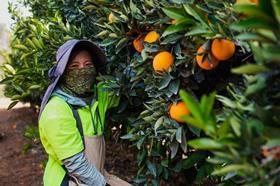
A newly enacted border zone along the Murray River, aimed at curbing the spread of Covid-19 from Victoria to New South Wales (NSW), could have a disastrous impact on the Australian citrus industry, which is approaching its peak harvest period.
Citrus Australia chief executive, Nathan Hancock, took to social media platform Twitter, to express his dismay at the NSW health department, and in particular, health and medical research minister Brad Hazzard.
In a series of tweets, Hancock said NSW citrus crops would be left to rot unless Hazzard steps in and provides citrus growers with immediate information on seasonal workers.
Under the new restrictions, seasonal workers have been expressly forbidden from crossing the border to pick fruit on farms where they have been working for weeks. This is despite agriculture being deemed as a critical service by the NSW government.
“The NSW health department and the NSW government have failed to present a sensible case as to why seasonal workers who have been working and living in the community, [who] have no symptoms and are healthy should be targeted in this way,” tweeted Hancock.
“It is reckless policy making on the run that has impacts on the community and singles out a group of people with no basis for this discrimination. NSW Health needs to rectify this issue immediately or show evidence as to why this course of action is justified.”
Hancock said it was clear the decision had been made by government officials who don’t have a clear understanding and appreciation of how the industry operates.
“It is infuriating that industry is asked to provide a weight of evidence that seasonal workers are critical – the health minister should show weight of evidence that holding a visa makes you more likely to be a Covid-19 carrier,” he tweeted.
“This is discrimination at best and a complete disregard for one of the key industries that supports these border towns. I am hearing from growers today who cannot get the same workers that have been there since May across the border to go to work.
“Bus loads have been turned away. Thousands of bins of citrus won't be picked today because of bureaucratic bungling,” tweeted Hancock.
Under the rules, workers crossing the border would be required to self-isolate for the minimum fortnight, which Citrus Australia said would cost growers and the regional and national economy millions of dollars, as fruit would be left to rot on trees.
NSW Premier, Gladys Berejiklian, addressed the issue during a press conference this morning (22 July), saying the state government is in contact with community leaders in regional towns along the border on a daily basis.
'We try to control what happens on our side, but we have no knowledge of the level of community exposure [of Covid-19] in Victoria,' said Berejiklian.
It's clear the NSW government is taking a hard-line approach to the issue facing the citrus industry and it's seasonal workforce, highlighting it has been a long-standing issue.
'We've said for seasonal workers it doesn't matter where you're from, if you're coming into NSW, you have to go through 14 days of isolation,' explained Berejiklian.
'That's our standard practice and that won't change, and nor should it change frankly. Anything that's high risk needs to be curtailed. Everybody has to comply.'
Berejiklian nominated people on JobKeeper and JobSeeker as possible candidates to make up for any shortfall in labour this season.
'Young people displaced from hospitality and airlines who need jobs [should look to work in harvesting]. I don't feel there's a labour shortage in NSW. But if people want to come in [from Victoria] and do that work, then they will have to be subjected to that isolation period,' said Berejiklian.
Ratings squeezed
It has been a busy fortnight for the peak industry body, and Hancock in particular.
On Friday 17 July, the Food Regulation Forum, comprising Ministers from every Australian state and territory, met and rejected federal agriculture minister David Littleproud’s proposals to retain the current 5-star rating for juice.
Under the current revised guidelines to the HSR system, the rating for fresh fruit and vegetable juice with no added sugar would fall from 5 stars to as low as 2 ½ stars, the same as diet soft drink.
Littleproud said retaining the current 5-star rating would recognise the nutritional benefits of fruit juice within the non-dairy beverages category, and would ensure fruit juice retains a lower rating than diet carbonated beverages.
Fruit juice currently contributes A$736m to the Australian economy and citrus growers and juice factories contribute significantly to rural economies throughout Australia.
Hancock said the effective demonisation of fresh juice – a 100 per cent natural product with no additives or preservatives – defied common sense.
“Under the revised HSR system as it stands, 100 per cent fresh juice would receive less stars than diet cola which contains additives and preservatives and no nutritional benefits,” explained Hancock.
“The algorithm that underpins the new HSR assesses fresh juice on sugar content alone and does not consider essential nutrients, such as Vitamin C, Potassium, Folate and magnesium, or antioxidants.
“It also contradicts the Australian Dietary Guidelines (ADG), which places fresh juice in the ‘eat more of’ category. There are allowances in the ADG for the substitution of fruit juice for a whole piece of fruit in the diet,” he added.



